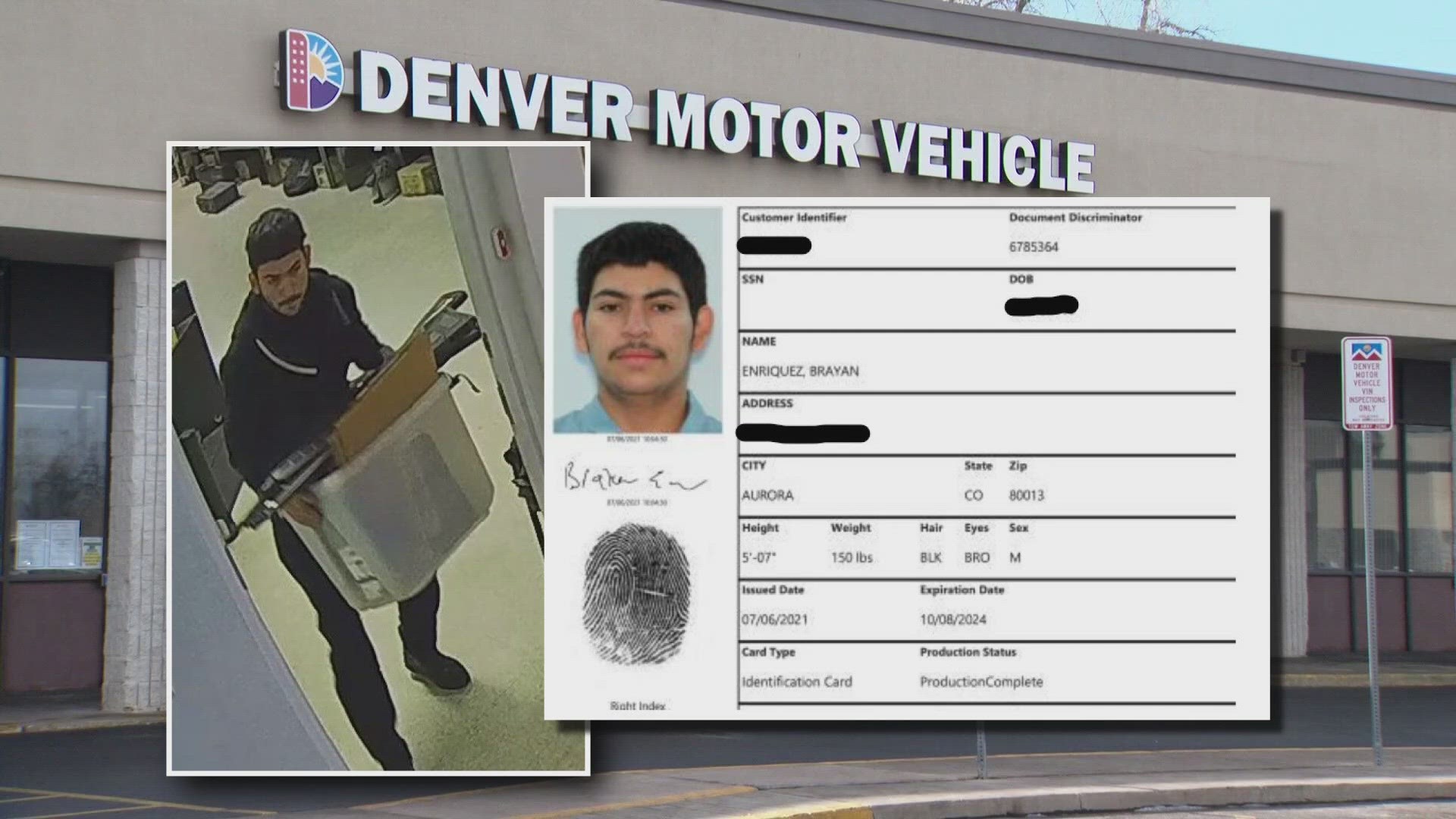DENVER — Numbers from the state's motor vehicle division reveal police are tapping into its facial recognition program more every year, as civil rights groups express concern about a lack of regulation and oversight.
In a recent case, from October, federal records show ATF investigators requested an image scan at the Colorado DMV after security cameras captured a man walking out of a Denver gun shop with guns and ammo.
The face scan pointed to two men, including a 20-year-old man named Brayan Enriquez, according to a federal criminal complaint. Investigators were able to use the DMV information to find Enriquez and then eventually get a family member to identify Enriquez as the man in the gun store robbery security video.
“Based on the information provided, investigators began researching the last known addresses of the alleged suspects. Your Affiant would like to inform the courts that the information provided by the DMV was only utilized as a tool to further the investigation,” one of the investigators wrote in court documents.
Investigators also pointed out in the criminal complaint the face scan of the second suspect led to a man who didn’t have anything to do with the crime.
The example is one of 465 times law enforcement agencies have requested to use the state’s DMV facial recognition program since July 1, 2019.
Records show every fiscal year, the number of law enforcement requests has increased.
Face scan requests per fiscal year:
- Current (2023/2024): 72
- 2022/2023: 157
- 2021/2022: 122
- 2020/2021: 72
- 2019-2020: 42
DMV records also show a “possible match” comes up only about one-third of the time over the last four years.
"I would say that facial recognition, of all of the biometric technologies, has come light-years from the early uses,” said David Shipley, who runs the Colorado Information Sharing Consortium, a group of law enforcement agencies that use a facial recognition database separate from the DMV.
The consortium’s database is made up of photos, including mugshots.
Only five agencies have followed the correct legal steps to use the consortium’s database, Shipley said.
While Shipley couldn’t speak directly to how police use the DMV facial recognition program, he did say typically investigators do not rely on a match or a possible hit for their whole case.
“It's not the end all be all, nor is it the answer. It is simply a lead,” Shipley said.
The increased use of the DMV’s facial recognition program comes two years after state lawmakers passed a bill that was intended to curb the use of the technology by law enforcement.
The bill requires numerous steps an agency must take before they can use a facial recognition service, including establishing written policies, requiring training for people who use it, and holding public meetings.
However, DMV records show more than 40 agencies, including police from outside of Colorado, have requested DMV image scans.
It’s currently unknown if the agencies who are currently using the DMV database are in compliance with the law.
The DMV does require agencies to fill out an online questionnaire for each request. Requests can be denied.
A state task force designed to examine how facial recognition technology is used in Colorado has met several times over the past year, but has not examined the DMV’s facial recognition program, according to meeting minutes.
Anaya Robinson, a senior policy strategist at the ACLU in Colorado, sits on the task force and expressed concern about the lack of oversight of how police use the technology.
“I don't think that the transparency is there,” Robinson said, while questioning if police are actually following state law.
“I think heavy regulation is the only responsible route to take, making sure that there is consistency in how these technologies are being used,” Robinson said.
State Sen. Chris Hansen, a Democrat, who sponsored the facial recognition bill, also sits on the task force and said the group is focusing on how police retain records.
“We want to make sure that we don't have too much surveillance or inappropriate use of the technology,” Hansen said.
> If you have any information about this story or would like to send a news tip, you can contact jeremy@9news.com.
SUGGESTED VIDEOS: Investigations & Crime

